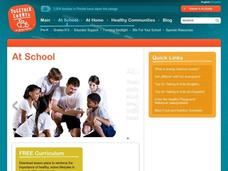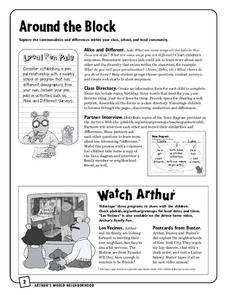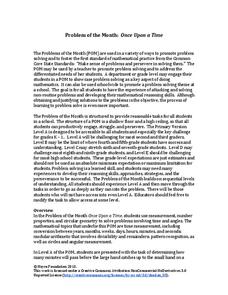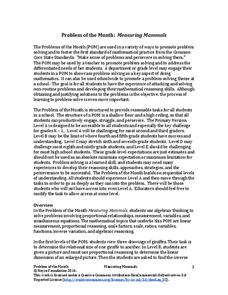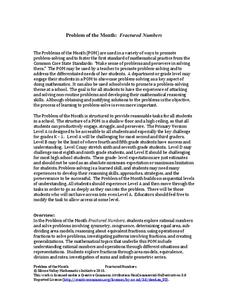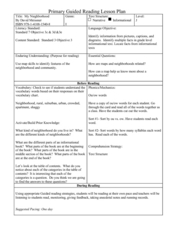Curated OER
Full Esteem Ahead
Young learners who feel good about themselves will fare better in the long run than those who do not have a high level of self-esteem. Introduce youngsters to what it means to like themselves. Discuss positive characteristics and...
Denver Art Museum
Alien Beauty
"Beauty is in the eye of the beholder," is a popular phrase in our society. The lesson here puts the phrase to the test as pupils explore what truly is beautiful through a study of some Japanese folk art. A careful examination of the...
Illustrative Mathematics
How Long
It won't take young mathematicians long to learn how to measure length with this fun, hands-on activity. Working in pairs, children use Unifix® or snap cubes to measure and record the lengths of different classroom objects. To extend the...
PBS
Around the Block
Arthur and his friends help children explore the concepts of family, community, and diversity in a fun series of activities. From performing peer interviews to mapping out the different places students have lived or visited, this...
Ed Galaxy
Postcard Template
Wish you were here! Have kids express their salutations and warm wishes with postcards. The worksheet provides two postcard templates for kids to address, sign, and illustrate.
US Department of Veterans Affairs
Celebrating America's Freedoms
From a flag-raising ceremony to a poster contest, there are many ways for learners to pay respect on Veteran's Day. Class members participate in one or many activities to honor those who served our country.
Fairbanks North Star Borough School District
Eric Carle Mural
Inspire first grade artists to learn about abstract and realistic art while reading Eric Carle's Where are you Going? To See My Friend. Young artists design and make a mural collage by tearing shapes of paper while comparing English and...
Noyce Foundation
Cut It Out
Explore the mathematics of the paper snowflake! During the five lessons progressing in complexity from K through 12, pupils use spatial geometry to make predictions. Scholars consider a folded piece of paper with shapes cut out....
Noyce Foundation
Once Upon a Time
Examine the relationship between time and geometry. A series of five lessons provides a grade-appropriate problem from elementary through high school. Each problem asks learners to compare the movement of the hands on a clock to an angle...
Noyce Foundation
Digging Dinosaurs
Build a function to solve problems rooted in archeology. A comprehensive set of five lessons presents problems requiring individuals to use functions. The initial lesson asks learners to find the possible number of dinosaurs from a...
Noyce Foundation
Measuring Mammals
Explore the meaning of scale and proportion with a set of five activities that examines the topic from elementary through high school. The first lessons explore ratio by examining pictures of different sizes. The next three activities...
Noyce Foundation
The Shape of Things
Investigate the attributes of polygons. A thorough set of lessons presents problem scenarios for elementary through high school classes. The first lessons focus on basic characteristics of polygons, including the line of symmetry. As the...
Noyce Foundation
Miles of Tiles
Create number sentences and equations to solve geometric problems. Each activity in the series of five asks young mathematicians to consider different-sized tiles to build structures according to specific criteria. The first activities,...
Noyce Foundation
Surrounded and Covered
What effect does changing the perimeter have on the area of a figure? The five problems in the resource explore this question at various grade levels. Elementary problems focus on the perimeter of rectangles and irregular figures with...
Noyce Foundation
Movin 'n Groovin
Examine the consequences of varying speed. An engaging set of five problem sets challenges young mathematicians by targeting a different grade level from K-12. In the initial lesson, scholars make conclusions about the time it...
Noyce Foundation
Perfect Pair
What makes number pairs perfect? The resource provides five problems regarding perfect pairs of numbers, the definition of which changes in complexity with each task. Solutions require pupils to apply number sense and operations, as well...
Noyce Foundation
Cubism
If cubism were a religion, would you follow it? Lower-level tasks focus primarily on counting the number cubes in a structure and relating the number to surface area. As learners progress to higher-level tasks, isometric drawings and...
Noyce Foundation
Piece it Together
Score some problems all related to soccer balls. The first few problems focus on pattern blocks to see relationships between figures. More advanced problems focus on actual soccer balls, the patterns on the balls, and their volumes and...
Noyce Foundation
Double Down
Double the dog ears, double the fun. Five problems provide increasing challenges with non-linear growth. Topics include dog ears, family trees and population data, and geometric patterns.
Noyce Foundation
Fractured Numbers
Don't use use a fraction of the resource — use it all! Scholars attempt a set of five problem-of-the-month challenges on fractions. Levels A and B focus on creating fractions and equivalent fractions, while Levels C, D, and E touch on...
Montclair Art Museum
Eric Carle: Animals and Friends
Celebrate Eric Carle’s beloved children’s books, especially those about animals. Teachers and readers alike engage in Carle’s books as they explore the art and color in each of his stories, and how these elements support comprehension.
Indiana Department of Education
Social Emotional Learning Competencies PK-12 Lesson Plans
Looking for lesson plans that address social and emotional learning competencies? Here's help in the form of a 166-page packet that includes lesson plans for elementary, middle, and high school learners. Seven detailed plans are provided...
Curated OER
My Neighborhood:
Young scholars act as tour guides for their communities after conducting research about their neighborhoods. After conducting research, students write stories and create maps of their communities to share with classmates and community...
Curated OER
Create Your Own Homophone Worksheets
Students develop their own homophone worksheet. They practice the spelling and using the different homophones. They participate in a homophone bee to end the lesson.
Other popular searches
- Word Processing Skills
- Word Processing Activities
- Advanced Word Processing
- Basic Word Processing
- Word Processing Project
- Word Processing and Bullets
- Word Processing Lessons
- 1st Grade Word Processing
- Word Processing Documents
- Computer. Word Processing
- Addresses Word Processing
- Computer Word Processing


